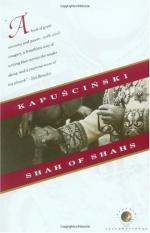
|
| Name: _________________________ | Period: ___________________ |
This test consists of 5 short answer questions, 10 short essay questions, and 1 (of 3) essay topics.
Short Answer Questions
1. What is the occupation of Mr. Ferdousi?
2. What was Khomeini's stance regarding internationalism and foreign influence?
3. Why does Kapuscinski believe revolutions often preach a return to tradition?
4. In the extended metaphor of the play, what are the props and scenery?
5. Why are revolutions rare, according to Kapuscinski?
Short Essay Questions
1. What is the Shah forced by the Americans to do shortly before the revolution? How do the people react to the Shah's action?
2. What do revolution leaders do with Shah loyalists, and how does this action demonstrate a wide divide between Iranian and Western cultures?
3. What is the nature of the January 8, 1978 article in Etelat that helped to spur the Iranian revolution?
4. Describe the march of Engelob that Kapuscinski participates in, and how it starts.
5. Describe the meeting Azari has with a publisher friend.
6. What does Kapuscinski cite as the true cause of the Iranian revolution?
7. How does Mahmud Azari sum up the psychological atmosphere in Iran, and its relationship to the modernization going on?
8. What is the national response to the massacre of Qom? What events follow the massacre?
9. What extended metaphor does Kapuscinski offer for the relationship between the Shah, the Great Civilization, and the people of Iran?
10. What anecdote does Kapuscinski share about the Persian carpet salesman, and what is this salesman's message?
Essay Topics
Write an essay for ONE of the following topics:
Essay Topic 1
Iran is notable for being one of the largest concentrations of Shiite Muslims in the world.
1) What is Shiism? Explain what followers believe about Muhammad and Ali.
2) How does Shiism differ from Sunni Islam? How do the two sides get along?
3) How does Kapuscinski trace modern terrorism to Iranian Shiism?
Essay Topic 2
What role did oil play in Iran's history? List major events that involved oil, particularly the West's interest in Iranian oil reserves. For Kapuscinski, what does oil represent/symbolize for the poor people of the Middle East?
Essay Topic 3
Describe the basic philosophical differences between conservatism and liberalism. How was this debate/struggle manifest in the aftermath of the Iranian Revolution?
|
This section contains 1,018 words (approx. 4 pages at 300 words per page) |

|




